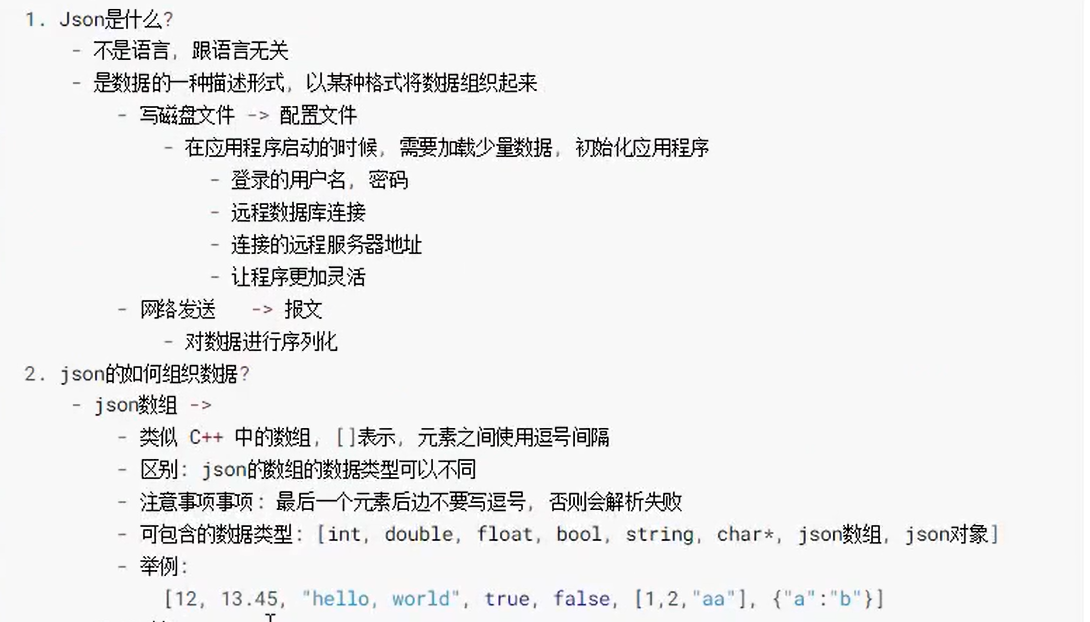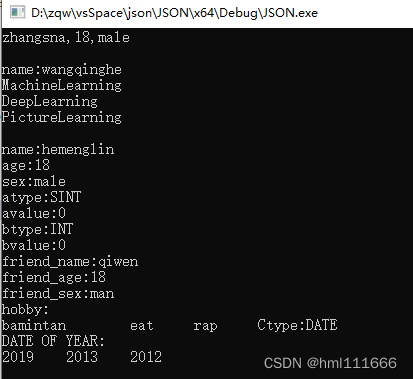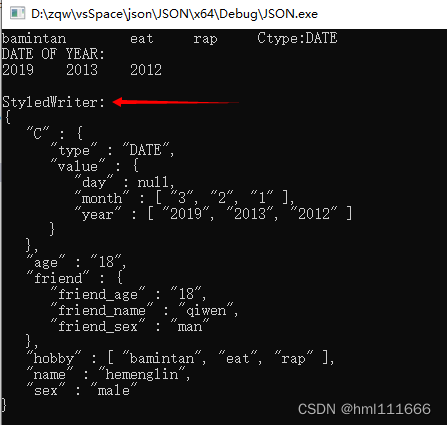jsoncpp的基本操作
基本概念:


2. jsoncpp 的使用
jsoncpp库中的类被定义到了一个Json命名空间中,建议在使用这个库的时候先声明这个命名空间:
using namespace Json;
使用jsoncpp库解析json格式的数据,我们只需要掌握三个类:
Value 类:将json支持的数据类型进行了包装,最终得到一个Value类型
FastWriter类:将Value对象中的数据序列化为字符串
Reader类:反序列化, 将json字符串 解析成 Value 类型
2.1 Value类
这个类可以看做是一个包装器,它可以封装Json支持的所有类型,这样我们在处理数据的时候就方便多了。
枚举类型 说明 翻译
nullValue ‘null’ value 不表示任何数据,空值
intValue signed integer value 表示有符号整数
uintValue unsigned integer value 表示无符号整数
realValue double value 表示浮点数
stringValue UTF-8 string value 表示utf8格式的字符串
booleanValue bool value 表示布尔数
arrayValue array value (ordered list) 表示数组,即JSON串中的[]
objectValue object value (collection of name/value pairs) 表示键值对,即JSON串中的{}
构造函数
Value类为我们提供了很多构造函数,通过构造函数来封装数据,最终得到一个统一的类型。
// 因为Json::Value已经实现了各种数据类型的构造函数
Value(ValueType type = nullValue);
Value(Int value);
Value(UInt value);
Value(Int64 value);
Value(UInt64 value);
Value(double value);
Value(const char* value);
Value(const char* begin, const char* end);
Value(bool value);
Value(const Value& other);
Value(Value&& other);
检测保存的数据类型
// 检测保存的数据类型
bool isNull() const;
bool isBool() const;
bool isInt() const;
bool isInt64() const;
bool isUInt() const;
bool isUInt64() const;
bool isIntegral() const;
bool isDouble() const;
bool isNumeric() const;
bool isString() const;
bool isArray() const;
bool isObject() const;
将Value对象转换为实际类型
Int asInt() const;
UInt asUInt() const;
Int64 asInt64() const;
UInt64 asUInt64() const;
LargestInt asLargestInt() const;
LargestUInt asLargestUInt() const;
JSONCPP_STRING asString() const;
float asFloat() const;
double asDouble() const;
bool asBool() const;
const char* asCString() const;
对json数组的操作
ArrayIndex size() const;
Value& operator[](ArrayIndex index);
Value& operator[](int index);
const Value& operator[](ArrayIndex index) const;
const Value& operator[](int index) const;
// 根据下标的index返回这个位置的value值
// 如果没找到这个index对应的value, 返回第二个参数defaultValue
Value get(ArrayIndex index, const Value& defaultValue) const;
Value& append(const Value& value);
const_iterator begin() const;
const_iterator end() const;
iterator begin();
iterator end();
对json对象的操作
Value& operator[](const char* key);
const Value& operator[](const char* key) const;
Value& operator[](const JSONCPP_STRING& key);
const Value& operator[](const JSONCPP_STRING& key) const;
Value& operator[](const StaticString& key);
// 通过key, 得到value值
Value get(const char* key, const Value& defaultValue) const;
Value get(const JSONCPP_STRING& key, const Value& defaultValue) const;
Value get(const CppTL::ConstString& key, const Value& defaultValue) const;
// 得到对象中所有的键值
typedef std::vector<std::string> Members;
Members getMemberNames() const;
将Value对象数据序列化为string
// 序列化得到的字符串有样式 -> 带换行 -> 方便阅读
// 写配置文件的时候
std::string toStyledString() const;
2.2 FastWriter 类
// 将数据序列化 -> 单行
// 进行数据的网络传输
std::string Json::FastWriter::write(const Value& root);
2.3 Reader 类
bool Json::Reader::parse(const std::string& document,
Value& root, bool collectComments = true);
参数:
- document: json格式字符串
- root: 传出参数, 存储了json字符串中解析出的数据
- collectComments: 是否保存json字符串中的注释信息
// 通过begindoc和enddoc指针定位一个json字符串
// 这个字符串可以是完成的json字符串, 也可以是部分json字符串
bool Json::Reader::parse(const char* beginDoc, const char* endDoc,
Value& root, bool collectComments = true);
// write的文件流 -> ofstream
// read的文件流 -> ifstream
// 假设要解析的json数据在磁盘文件中
// is流对象指向一个磁盘文件, 读操作
bool Json::Reader::parse(std::istream& is, Value& root, bool collectComments = true);
3. json 读写
为什么要用json文件呢?
我们最常使用的存储数据的方式有很多,比如利用txt文件存,利用xml存,利用word存,利用Excel存,如果我们要求比较高,还可以使用数据库存。
相对于txt,word来说,json格式更加明确,获取重要信息非常方便。
相对于xml来说,json格式更加简洁,存储同样的文件,花费的内存更小。
相对于Excel来说,json更适合存储字符类文件。Excel相当于比较简单的数据库了。
相对于数据库来说,json更加方便,数据库我们还需要做一些设置,安装一些软件。json可以直接使用。
JSON 比更小、更快,更易解析。JSON 易于人阅读和编写。C、Python、C++、Java、PHP、Go等编程语言都支持 JSON。
二、JSON的实例如下:
{ "sites": [ { "name":"百度" , "url":"www.baidu.com" }, { "name":"google" , "url":"www.google.com" }, { "name":"微博" , "url":"www.weibo.com" } ] }
JSON语法:
数据在 名称/值 对中
数据由逗号 , 分隔
使用斜杆来转义 \ 字符
大括号 {} 保存对象
三、C++操作json文件
读取JSON文件之前,首先要了解jsoncpp库中的两个类:Value和Reader。
在这里我就不多讲了,可以参考这篇博客:
Value、Reader
json数据如下
1 2 3 4 5 | {"name" : "shuiyixin","age" : "21","sex" : "man"} |
读取代码如下:
void readStrJson() { //字符串 string str = "{\"name\":\"shuiyixin\",\"age\":21,\"sex\":\"man\"}"; //声明类的对象 Json::Reader reader; Json::Value root; //从字符串中读取数据 if (reader.parse(str, root)) { string name = root["name"].asString(); int age = root["age"].asInt(); string sex = root["sex"].asString(); //输出 cout << name+ "," << age << "," << sex << endl; } }
读取JSON文件
{ "A": { "type": "SINT", "value": 0 }, "age": "18", "B": { "type": "INT", "value": 0 }, "C": { "type": "DATE", "value": { "year": [ "2019", "2013", "2012" ], "month": [ "1", "2", "3" ] } }, "friend": { "friend_age": "18", "friend_name": "qiwen", "friend_sex": "man" }, "hobby": [ "bamintan", "eat", "rap" ], "name": "hemenglin", "sex": "male" }
读取文件相关的代码如下:
void readFileJson() { Json::Reader reader; Json::Value root; ifstream in("demo.json", ios::binary); if (!in.is_open()) { cout << "Error opening file\n"; return ; } if (reader.parse(in, root)) { string name = root["name"].asString(); string age = root["age"].asString(); string sex = root["sex"].asString(); cout << "name:" << name << endl; cout << "age:" << age << endl; cout << "sex:" << sex << endl; string friend_name = root["friend"]["friend_name"].asString(); string friend_age = root["friend"]["friend_age"].asString(); string friend_sex = root["friend"]["friend_sex"].asString(); string atype = root["A"]["type"].asString(); string avalue = root["A"]["value"].asString(); string btype = root["B"]["type"].asString(); string bvalue = root["B"]["value"].asString(); cout << "atype:" << atype << endl; cout << "avalue:" << avalue << endl; cout << "btype:" << btype << endl; cout << "bvalue:" << bvalue << endl; cout << "friend_name:" << friend_name << endl; cout << "friend_age:" << friend_age << endl; cout << "friend_sex:" << friend_sex << endl; cout << "hobby:" << endl; for (unsigned int i = 0; i < root["hobby"].size(); i++) { string str = root["hobby"][i].asString(); cout << str << "\t"; } string Ctype = root["C"]["type"].asString(); cout << "Ctype:" << Ctype << endl; //string Cvalue = root["C"]["value"]["year"].asString(); //cout << "Cvalue:" << Cvalue << endl; cout << "DATE OF YEAR:" << endl; for (unsigned int i = 0; i < root["C"]["value"]["year"].size(); i++) { string str = root["C"]["value"]["year"][i].asString(); cout << str << "\t"; } } else { cout << "parse error\n" << endl; } in.close(); }
读的效果如图:

写入JSON文件
写入的文件就是上面的demo.json文件,代码如下:
1 2 3 4 5 6 7 8 9 10 11 12 13 14 15 16 17 18 19 20 21 22 23 24 25 26 27 28 29 30 31 32 33 34 35 36 37 38 39 40 41 42 43 44 45 46 47 48 49 50 51 52 53 54 55 56 57 58 59 60 | void writeFileJson(){//根节点Json::Value root;root["name"] = Json::Value("hemenglin");root["age"] = Json::Value("18");root["sex"] = Json::Value("male");//子节点Json::Value bro;bro["friend_name"] = Json::Value("qiwen");bro["friend_age"] = Json::Value("18");bro["friend_sex"] = Json::Value("man");root["friend"] = Json::Value(bro);//ctestJson::Value Ctest;Ctest["type"] = Json::Value("DATE");Ctest["value"] = Json::Value();root["C"] = Json::Value(Ctest);Json::Value Ctest2;Ctest2["year"] = Json::Value();Ctest2["month"] = Json::Value();Ctest2["day"] = Json::Value();root["C"]["value"] = Json::Value(Ctest2);root["C"]["value"]["year"].append("2019");root["C"]["value"]["year"].append("2013");root["C"]["value"]["year"].append("2012");root["C"]["value"]["month"].append("3");root["C"]["value"]["month"].append("2");root["C"]["value"]["month"].append("1");//ctest//数组形式root["hobby"].append("bamintan");root["hobby"].append("eat");root["hobby"].append("rap");cout << "\nStyledWriter:" << endl;Json::StyledWriter sw;cout << sw.write(root) << endl << endl;ofstream os;os.open("demo.json", std::ios::out);if (!os.is_open()){cout << "error:can't find the file" << endl;}os << sw.write(root);os.close();} |
写的效果如图:

可以参考:
https://blog.csdn.net/hml111666/article/details/127227992
https://subingwen.cn/cpp/jsoncpp/?highlight=json





【推荐】国内首个AI IDE,深度理解中文开发场景,立即下载体验Trae
【推荐】编程新体验,更懂你的AI,立即体验豆包MarsCode编程助手
【推荐】抖音旗下AI助手豆包,你的智能百科全书,全免费不限次数
【推荐】轻量又高性能的 SSH 工具 IShell:AI 加持,快人一步
· 分享一个免费、快速、无限量使用的满血 DeepSeek R1 模型,支持深度思考和联网搜索!
· 使用C#创建一个MCP客户端
· 基于 Docker 搭建 FRP 内网穿透开源项目(很简单哒)
· ollama系列1:轻松3步本地部署deepseek,普通电脑可用
· 按钮权限的设计及实现